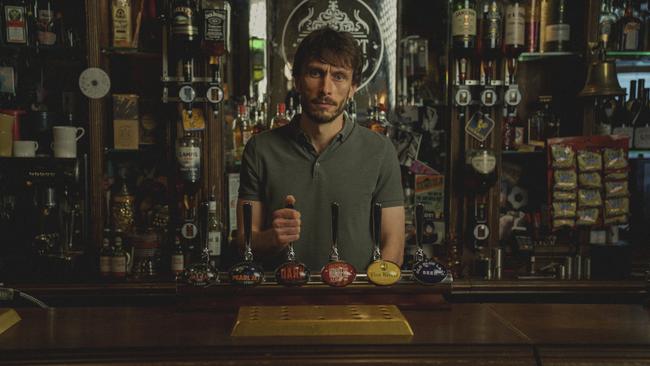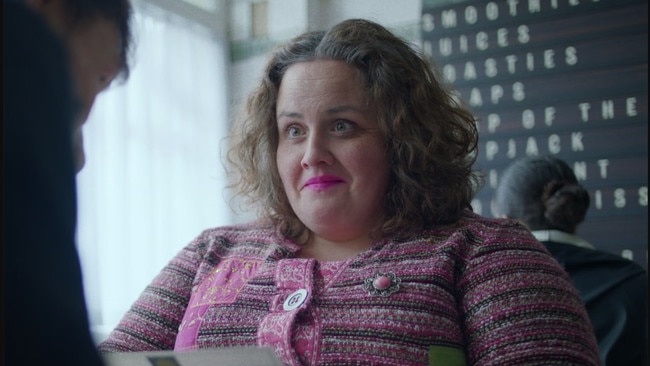Baby Reindeer: You’ll want to watch this whole series in one sitting
Baby Reindeer’s unsparing portrait of a man in meltdown has everybody talking — but you need to come prepared.

Baby Reindeer appeared on Netflix almost out of nowhere, a seven-part series that is harrowing to watch but totally irresistible at the same time – and might just prove to be one of the best TV shows of this year. Within a week of its release it was the streaming service’s number one TV show in both the US and Britain. And Australia quickly followed, spread by an unsettled word of mouth.
It’s emotionally challenging, completely engaging, and acted with raw authenticity. In an unsparing portrait of a consciousness in meltdown, its central protagonist, a would-be stand-up comic, encounters a psychotic stalker, disconnected from reality, with delusions about being in a relationship with him.
Adapted by Scottish comedian Richard Gadd from his award-winning one-man show Monkey See Monkey Do, the series recounts the true story of the way he was harassed and stalked for years, and a terrible sexual encounter with a would-be mentor that changed his life.
Baby Reindeer stars Gadd as Donny Dunn, the fictionalised version of himself, Nava Mau as his transsexual girlfriend Teri, and Jessica Gunning as Martha, the stalker, in a performance that is visceral, weirdly charming, and at times inflammatory (Gadd’s real stalker has been heavily fictionalised for legal reasons in the series).

The seven-episode miniseries is directed by Weronika Tofilska, who has worked on Amazon’s Hanna and HBO’s His Dark Materials, and is produced by Matthew Mulot, also responsible for comedy hit The Completely Made-Up Adventures Of Dick Turpin.
Like his theatrical show from all accounts, Baby Reindeer offers, as one astonished critic wrote of Monkey See Monkey Do, “open-vein emotional engagement over laughs”, though there are plenty, if often uncomfortable, in the TV version.
“I think life is a comedy-drama,” Gadd says. “Some of the darkest places I’ve been in, I’ve found giggles somehow. And some of the funniest places I’ve been in, including backstage at comedy clubs with other comedians, can be the most depressing places as well. I always think life is a mixture of light and shade. So I wanted Baby Reindeer to be a blend of them both.”
It’s not only the unsparing portrayal of a consciousness as it disintegrates but an eerily sympathetic look into the mind of a stalker. “Stalking on television tends to be very sexed-up,” Gadd says on Netflix web site Tedum. “It has a mystique. It’s somebody in a dark alleyway. It’s somebody who’s really sexy, who’s very normal, but then they go strange bit by bit.”
But stalking is a sign of mental illness, he says, and he wanted to show the layers of stalking with a human quality he hadn’t seen on television. “It’s a stalker story turned on its head. It takes a trope and turns it on its head.”
Gadd makes clear that he didn’t want to write “a victim narrative.” He says: “I think art is quite interesting when you don’t know who you are on the side of. I wanted it to be layered, and I wanted it to capture the human experience. The human experience is that people are good, but they have bits of bad and they make mistakes.”
And Donny, despite himself, does, and his mistakes, often initially kindly meant, unhinge him. It’s as if, determined to become a successful comedian but dying the harder he tries, he suddenly becomes part of someone’s existential crisis just when he is suffering one himself. Anxiety and feelings of dread consume him as he’s forced by Martha to confront the limitations of his sordid existence.
It begins with Donny, the would-be comic, and his terrible act involving a comic tweedy suit with wide lapels, yellow shirt and bright blue tie, and a case full of props, walking into a police station to report that he is being stalked. The policeman, played in a nice deadpan way by Thomas Coombes, asks how long it’s been going on and he answers six months. Why, asks the policeman, has it taken so long to report?
(The show scathingly highlights the problems male victims encounter when engaging with criminal justice agencies. “Honestly my advice to someone who ever thought of pressing charges would be: it’s a f--king nightmare process, and it takes years,” Gadd told the Guardian recently). And so Donny takes us, in an increasingly frantic voiceover, back to the beginning of his nightmare.
He works in a pub to help pay the bills while he struggles with his stand-up. Gigs are hard to find. One day an obviously distressed woman tentatively walks into the front bar. She’s Martha and it turns out she’s so broke she can’t afford a drink, even though she tells him she’s a successful lawyer. He kindly offers her a cup of tea on the house.

It’s the first of his terrible mistakes and the beginning of a harrowing downward emotional spiral. “I felt sorry for her, that’s the first feeling I felt,” Donny says in his omnipresent voiceover. “It’s a patronising, arrogant feeling to feel sorry for someone you’ve only just laid eyes on, but I did.”
She is soon back every day, talking incessantly, giddy, laughing ceaselessly, boasting of her highbrow friends, politicians and the like, unfiltered and unapologetic. She bestows on him the moniker “Baby Reindeer” after a childhood toy (“It had big lips, huge eyes, and the cutest wee bum,” she tells him) and quickly invades all his boundaries with her obsessive desire for him to admire her.
He’s weirdly acquiescent, unable to bluntly say enough is enough, though he tries rather ineptly.
“People are afraid to admit they made mistakes, and I think a lot of mistakes by humans are made through people-pleasing,” Gadd says of his own, personal experience. “You stay in a lie because it’s easier to circumvent the tension of a situation. I never wanted to upset someone who was vulnerable.”
But then he starts receiving her emails. There eventually are thousands – as well as hundreds of voice messages sent from her iPhone, though she doesn’t seem to carry one. Somehow her flattery provides some kind of emotional validation for the down-and-out Donny who is unable to refuse her, even when she starts to turn up at his performances.
It’s obvious that she has some sort of severe personality disorder, one that gives her an exaggerated feeling of self-worth the more he acquiesces to her demands. Her emotions are unpredictable, and she has a high sensitivity to rejection and abandonment.
She soon develops a delusional belief in romantic destiny, of which he refuses to become a part, and with her ego easily bruised and her interpersonal boundaries so flimsy, she develops a sadistic urge to torment him.
He feels both intimidated and oddly charmed by her conduct, and her extreme flirtatiousness. It’s an ambiguity that makes it hard for him to exit the scenario she creates around them both.
“There was just something so awful yet thrilling about doing something that would devastate my life even further,” he says at one low point.
The performances are exemplary. Gadd’s courage and honesty, and his shame, too, are obviously on display, sometimes fiercely, as is a performance that is technically as assured as anything I’ve seen this year.
Gunning is simply a revelation, capable of eliciting sorrow and pity one moment and then terror the next. And Nava Mau’s Teri is a beautifully controlled performance as well, far removed from stereotype and cliche.
The London-based Polish Tofilska directs with almost uncanny feel for Gadd’s script, highlighting both the creeping sense of alarm and the oddball humour that lightens moments. Each shot contains a surprise effect, building emotional shocks.
At times she uses the aesthetics of horror movies, an expansive use of uncomfortable close ups, the camera subtly pushing in on the characters to create a sense of disquiet, many with oddly tilted angles. It’s superbly done.
“I hope the show has a certain degree of greater good, and that it was worth a certain degree of self-sacrifice,” Gadd said recently. Well, it certainly was. You will want to watch it right through in one sitting.
Baby Reindeer is streaming on Netflix.


To join the conversation, please log in. Don't have an account? Register
Join the conversation, you are commenting as Logout